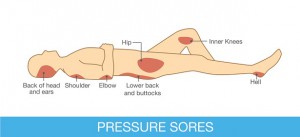 Pressure ulcers or bed sores are damaged areas of skin that result from staying in one position for too long or prolonged pressure on the skin. They tend to develop in areas where the skin is closest to the bones such as the heels, back, elbows and tailbone.
Pressure ulcers or bed sores are damaged areas of skin that result from staying in one position for too long or prolonged pressure on the skin. They tend to develop in areas where the skin is closest to the bones such as the heels, back, elbows and tailbone.
People who are limited in movement due to an illness or disability and are confined to a bed or wheelchair for an extended period of time are more at risk of developing pressure ulcers than others. Others who are also at risk of developing pressure ulcers. Those who wear prosthesis, diabetics, smokers and sufferers of peripheral arterial disease are also at risk of developing pressure ulcers.
Pressure ulcers develop quickly; here are the warning signs and symptoms to look out for:
- Tenderness, pain, softness or firmness, warmness or coldness of an area of skin.
- The skin is not broken but red.
- Redness or discoloration- If pressure is removed from an area that is discolored for more than 30 minutes and the skin has not returned to its natural hue, it is likely that an ulcer is developing.
- The outer layer of the skin is damaged. The area may blister or appear as an open wound.
- Loss of skin.
The following symptoms are likely to occur in the advanced stages of a pressure ulcer:
- The ulcer appears as a deep wound or crater-like.
- Loss of skin exposes a layer of fat, muscle, tendons or bones.
- There is tissue at the bottom of the wound that is dead, brown, black or yellow in color.
Pressure ulcers can be easier to prevent than treat. They can be prevented by:
- Changing positions
- Frequently shifting weight
- Using a specialty wheelchair
- Using a specialized mattress
- Using cushions to relieve pressure
- Monitoring skin
- Protecting skin
If you are at risk for developing pressure ulcers it is recommended that you and your healthcare team develop a strategy to help in prevention or treatment.
The Wound Care Center at Flushing Hospital Medical Center is a state-of-the-art unit that provides specialized, interdisciplinary wound care to patients who suffer from non-healing or chronic wounds.
For more information on the Wound Care Center or to schedule an appointment, call 718-670-4542.
All content of this newsletter is intended for general information purposes only and is not intended or implied to be a substitute for professional medical advice, diagnosis or treatment. Please consult a medical professional before adopting any of the suggestions on this page. You must never disregard professional medical advice or delay seeking medical treatment based upon any content of this newsletter. PROMPTLY CONSULT YOUR PHYSICIAN OR CALL 911 IF YOU BELIEVE YOU HAVE A MEDICAL EMERGENCY.
